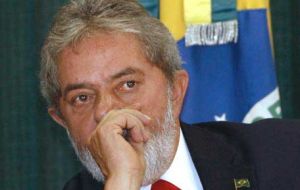MercoPress. South Atlantic News Agency
Truth committee in Brazil but with no review of past human rights’ crimes
 Former president Lula da Silva had to back-step when the military refused to yield
Former president Lula da Silva had to back-step when the military refused to yield Brazilian Senate Constitution and Justice Committee approved this week the bill for the creation of a National Truth Commission to research unsolved serious crimes committed between 1946 and 1988, which includes the controversial military dictatorship period from 1964 to 1985.
The bill had already been voted in the Lower House and was sponsored in the Senate by opposition lawmaker Aloysio Nunes. It was passed with no modifications to the Senate Human Rights Commission.
Once the Commission approves the text, the bill will face a full vote in the Senate.
However the bill which has been claimed for years by human rights groups including the annulment of a 1979 amnesty bill passed by the Brazilian military and which exempts them of responsibility in alleged crimes committed during their rule has yet to decide on punishments, if any.
This basically means that the blanket amnesty law prevails over any review in spite of the open dispute over the alleged crimes committed under military rule.
In effect last year Brazil’s Supreme Court confirmed the validity of the 1979 Amnesty law which definitively seals any chance of review of the crimes and culprits committed during the rabidly conservative, pro-business, anti-communist military dictatorship between 1964 and 1985.
Among some of the notorious political figures torture victims of the military regime is President Dilma Rousseff, a student leader at the time.
Under former president Lula da Silva the left wing of his Workers Party managed from the Human Rights Ministry to draft a bill which would have opened a review into serious crimes committed between 1964 and 1985, but a firm rejection from the three forces commanders and the Minister of Defence Nelson Jobim threatening to resign if the initiative prospered, blocked any advance on the issue.
Lula da Silva, the most popular president in Brazilian history in the last half century, pragmatically looked to a side, said Brazilians had to think in the future and shelved the initiative.
Furthermore Lula da Silva even extended the legal timetable for the disclosure of sensitive government documents and files referred to the controversial period, and with support from the Senate sealed for another half century documents referred to clearly abusive events of the late 19th and early 20th centuries involving Paraguay and Bolivia.
The first refers to the massacre of the Paraguayan people during the so called Triple Alliance war (1865/1870) and the second to the annexation of the Bolivian province of Acre (1903) in exchange for money and a horse to a corrupt president.
The new bill under discussion contemplates the creation of a seven-person ‘truth’ commission to be named by the Executive that in two years time must come up with an assessment of human rights crimes committed between 1946 and 1988.
Senator Nunes said that the commission will not establish the “punishments” for such crimes since they are covered in the case of the latest military government “by the 1979 Amnesty Law”.




Top Comments
Disclaimer & comment rulesCommenting for this story is now closed.
If you have a Facebook account, become a fan and comment on our Facebook Page!